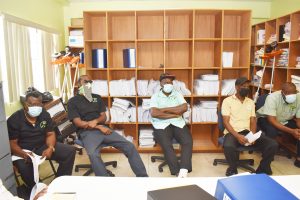BASSETERRE, ST. KITTS, July 26, 2021 (S.T.E.P.) — The Skills Training Empowerment Programme (STEP) is undertaking a private employers’ audit which will assist the government agency not only to know the exact number of private employers that have STEP workers, but will also help in identifying and making use of skills learnt by the trainees.
The STEP Private Employers’ Audit team met with Director of STEP Mr Emile Greene last week, where Team Leader Mr Leslian Daniel reported that they had so far audited 95 per cent of private employers who have STEP workers attached to their businesses on St. Kitts, outside of private farms.

The audit, which started in March, is designed to help STEP to properly verify the number of persons who are attached for training in the private sector, where they are located, from community to community, and how many different types of businesses are collaborating with STEP in the training of such employees.
Present at the meeting was STEP Field Operations Manager, Mr William Phillip. Other members of the STEP Private Employers’ Audit team were Work Plan and Verification Officer Mr Damian Weekes, Data Input Officer Ms Ercile French, and field members Mr Leroy Hodge, Mr Keith Hendricks, Mr Cleneiro McMahon, and Mr Leslie Connor.
“We want to have updated information about the business itself, address, telephone number, nature of the business, the skills that persons are being exposed to or being trained in an informal way,” explained Director Mr Greene.
Since STEP’s mandate is to prepare young persons to take available jobs in the market, the audit will provide an opportunity for STEP to know if the trainees are ready for positions available. The audit will also help to identify if the trainees have acquired sufficient knowledge informally for them to transition to do formal training at either the Advanced Vocational Educational Centre (AVEC) or other TVET institutions, or short term courses.
It was further noted that information gathered would allow STEP to know what skills persons are being exposed to. This would be useful should there be a need for a particular skill within the various sectors in the country, be it in construction, farming, tourism, or within early childhood education as STEP would be able to identify persons who can fill those positions and have them move from STEP and transition them into fulltime employment.
“So once we have that pool of information, we will be in a better position when business employers are looking for particular skills, then we can identify these persons and assign them accordingly,” observed Mr Greene.
The information being collected is being updated on the STEP Management Information System making it available at the click of a mouse. It is important for the country, and Government in particular, to have this information readily available and to have a better understanding of where and how the money allocated to STEP is being spent and utilised.
STEP also wants to cut down on bad practices and wastage, where people are assigned to private businesses and they are not turning up to work. This sometimes happens in situations where the STEP trainees might be a family member or have a friendship with the owner of the business. Also some employers do not manage the STEP trainees properly and allow them to work unsupervised.
“We want to eliminate – not just reduce – that kind of arrangement where people are being paid and they are not working, or they are not working for a whole week or they are not working for a full day, but yet they are being paid eight hours a day,” concluded Mr Greene. “In these times, when the country has to be very prudent with how money is spent, we at STEP want to make sure that any wastage or any indiscretion or poor practices by employers can be identified and corrected.”
The STEP Private Employers’ Audit team reported that it will be through with the exercise on St. Kitts by the end of this month. A similar audit will be carried out on the island of Nevis, which is expected to take a much shorter time as the island has fewer private employers compared to St. Kitts.
